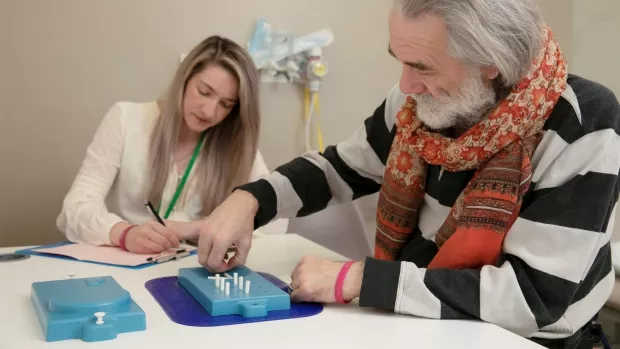
New drug shows potential for targeting B cells to treat MS
A new study shows people taking a drug called ofatumumab (brand name Kesimpta) experienced fewer relapses and showed fewer lesions on an MRI scan than people taking a different drug.
The pharmaceutical company Novartis have published the results of two phase III clinical trials testing a new drug called ofatumumab. The trials, called ASCLEPIOS I and II, included nearly 1,000 people with relapsing MS or active secondary progressive MS.
Read the full study in the New England Journal of Medicine
Fewer relapses and brain lesions
Results show ofatumumab reduces the number of both relapses and lesions on an MRI scan more effectively than an existing drug, teriflunomide.
One of the potential benefits of ofatumumab is that people can give themselves injections at home. So you wouldn’t have to go to a hospital for infusions.
We don’t yet know how ofatumumab compares to other highly intensive DMTs like ocrelizumab or alemtuzumab. This would need a head-to-head trial. But if ofatumumab is licensed, it gives people with active MS more choice over their treatment options.
Little evidence of slowing progression
The researchers also tested whether people taking ofatumumab's disability got better or worse over the course of 6 months. They measured disability progression using the EDSS.
Ofatumumab was significantly better than teriflunomide at slowing progression at three months, and at six months. Disability improvement was not significantly different.
They also saw no differences in brain shrinkage. Brain shrinkage means the volume of the brain is getting smaller. This is used by MS researchers as a sign that nerves are dying.
Clinical trials for MS progression
Because the study did not include anyone who had non-active progressive MS, we don’t know what effect the drug would have for these people.
Unfortunately, there are still very few studies that include people with non-active progressive MS. But we hope our planned clinical trials platform will change that.
And there are exceptions. The MS STAT2 trial of simvastatin is still looking for participants who have secondary progressive MS.
Find out more information about the trial and how to register on the MS STAT2 website
Targeting B cells
Ofatumumab works by targeting a type of immune cell called a B cell. It does this by blocking the activity of a protein found on the surface of B cells, called CD20.
Researchers have only fairly recently discovered the role of B cells in MS - most existing DMTs target T cells.
But drugs like ocrelizumab, the first licensed drug for primary progressive MS, are leading the way in demonstrating the potential of B cells therapies. And this new study adds another piece of evidence to that puzzle.



